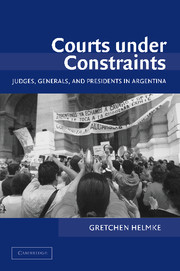Book contents
- Frontmatter
- Contents
- List of Tables
- List of Figures
- Preface and Acknowledgments
- 1 RULING AGAINST THE RULERS
- 2 THE LOGIC OF STRATEGIC DEFECTION
- 3 A THEORY OF COURT-EXECUTIVE RELATIONS: INSECURE TENURE, INCOMPLETE INFORMATION, AND STRATEGIC BEHAVIOR
- 4 JUDGES, GENERALS, AND PRESIDENTS: INSTITUTIONAL INSECURITY ON THE ARGENTINE SUPREME COURT, 1976–1999
- 5 THE REVERSE LEGAL-POLITICAL CYCLE: AN ANALYSIS OF DECISION MAKING ON THE ARGENTINE SUPREME COURT
- 6 THE DYNAMICS OF DEFECTION: HUMAN RIGHTS, CIVIL LIBERTIES, AND PRESIDENTIAL POWER
- 7 CONCLUSION: BROADER LESSONS AND FUTURE DIRECTIONS
- Appendix A Overview of the Federal Argentine Judiciary and the Argentine Supreme Court
- Appendix B The Argentine Supreme Court Decisions Data Set
- Appendix C Equilibria Proofs
- References
- Index
7 - CONCLUSION: BROADER LESSONS AND FUTURE DIRECTIONS
Published online by Cambridge University Press: 24 July 2009
- Frontmatter
- Contents
- List of Tables
- List of Figures
- Preface and Acknowledgments
- 1 RULING AGAINST THE RULERS
- 2 THE LOGIC OF STRATEGIC DEFECTION
- 3 A THEORY OF COURT-EXECUTIVE RELATIONS: INSECURE TENURE, INCOMPLETE INFORMATION, AND STRATEGIC BEHAVIOR
- 4 JUDGES, GENERALS, AND PRESIDENTS: INSTITUTIONAL INSECURITY ON THE ARGENTINE SUPREME COURT, 1976–1999
- 5 THE REVERSE LEGAL-POLITICAL CYCLE: AN ANALYSIS OF DECISION MAKING ON THE ARGENTINE SUPREME COURT
- 6 THE DYNAMICS OF DEFECTION: HUMAN RIGHTS, CIVIL LIBERTIES, AND PRESIDENTIAL POWER
- 7 CONCLUSION: BROADER LESSONS AND FUTURE DIRECTIONS
- Appendix A Overview of the Federal Argentine Judiciary and the Argentine Supreme Court
- Appendix B The Argentine Supreme Court Decisions Data Set
- Appendix C Equilibria Proofs
- References
- Index
Summary
Without effective institutional protections, judges face uncertain futures. For generations of scholars, such institutional insecurity has meant that judges will refuse to stand up to the government of the day. Under dictatorship, the conventional view is that only the most heroic or altruistic judges dare to uphold the law against an authoritarian regime. Under democracy, the continued absence of effective guarantees in many Latin American countries implies that court-executive relations are strictly a one-way affair. Executives regularly find ways to manipulate and control courts; courts are loath to limit the power of executives.
As the Argentine experience suggests, however, the facts do not always support these expectations. Judges under the military Proceso did little to assuage brutal state-led repression, but then commanded the military leadership to free “subversives.” Judges under the new democracy devoted their lives' work to arguing for the protection of human rights, but then limited the scope of the trials prosecuting former military leaders. Throughout the 1990s, members of the Court's so-called automatic majority repeatedly declared their loyalty to Menem but ultimately ruled against his bid for a third term. And in the midst of one of the worst economic crises in Latin American history, judges upheld decree laws designed to manage the economic crisis in one moment, only to strike them down a few months later.
Casual and expert observers alike have long suspected that the Argentine Supreme Court's behavior is politically driven and, indeed, criticize it on that very basis.
Information
- Type
- Chapter
- Information
- Courts under ConstraintsJudges, Generals, and Presidents in Argentina, pp. 153 - 174Publisher: Cambridge University PressPrint publication year: 2004
